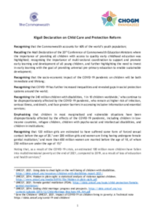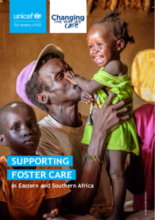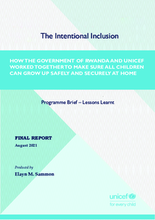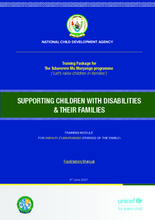This country page features an interactive, icon-based data dashboard providing a national-level overview of the status of children’s care and care reform efforts (a “Country Care Snapshot”), along with a list of resources and organizations in the country.
demographic_data
childrens_living_arrangement
children_living_without_bio
adoption
social_work_force
key_stakeholders
Key Stakeholders
Add New DataOther Relevant Reforms
Add New Datadrivers_of_institutionalisation
Drivers of Institutionaliziation
Add New Datakey_research_and_information
Key Data Sources
Add New DataReport on National Assessment of Centres caring for Children with Disabilities in Rwanda
National Integrated Child Rights Policy
Country Care Review: Rwanda
Prevalence and number of children living in institutional care: global, regional, and country estimates
The Way Forward Project Report
Community-Based Child Protection Mechanisms in Refugee Camps in Rwanda: An Ethnographic Study
Displaying 31 - 40 of 191
This is one of the resolutions adopted under the Kigali Declaration on Child Care and Protection Reform adopted on June 25, at the closure of the 2022 Commonwealth Heads of Government Meeting.
The UK Home Office has been accused of attempting to deport unaccompanied 16-year-olds to Rwanda in the first wave of asylum seekers to be sent to east Africa later this month. Charities have identified what they describe as a “worrying pattern” of children being classed as adults by Home Office age assessments, raising fears they could be among those deported 4,500 miles to Rwanda.
The Task Force on Foster Care of the Transforming Children's Care Global Collaborative Platform held the second spotlight webinar series on identifying foster carers on 5 May 2022.
The UNICEF-Changing the Way We Care Regional Learning Platform for Eastern and Southern Africa held its first webinar of the year on Child Protection System Strengthening and Care Reform.
This webinar will provide an overview of child protection system strengthening and the linkages between this approach and care reform. It will outline the ten components of a system strengthening approach to care reform and provide three examples of putting these components into practice. The examples will be presented by UNICEF country office staff, government agencies and their partners. They will focus on the development of the national care form strategy in Kenya, workforce strengthening for care reform in Rwanda, and care system assessment in Uganda.
This paper examines the nature and benefits of foster care and identifies some of the key challenges associated with this form of care in Eastern and Southern Africa. It outlines the elements of an enabling environment needed for successful large-scale foster care programmes, including legislation, guidance, changes to social norms, coordination mechanisms, and a strong social service workforce. The paper also provides lessons learnt from the region on how to support each stage of the foster care process.
Jeanne Uwamariya's firstborn Gloria Abijuru was born with a physical disability. The father to her children with whom they were not legally married abandoned his family when Abijuru was just 3 years old.
This present report describes the childcare reform process in Rwanda during 2020 and 2021, against the background of the overall reform initiated since 2012
These presentations from UNICEF and Alternative Care Thailand were delivered during the July 9, 2021, workshop of the Care Measurement Task Force of the Transforming Children's Care Global Collaborative Platform. The focus of the workshop was on care measurement initiatives in Eastern and Southern Africa and Thailand.
This is a Training Module for the Inshuti z’Umuryango volunteer community-based cadre to support the implementation of the Tubarerere Mu Muryango (TMM) Programme (‘Let’s raise children in families’) led by the National Child Development Agency (NCD).




